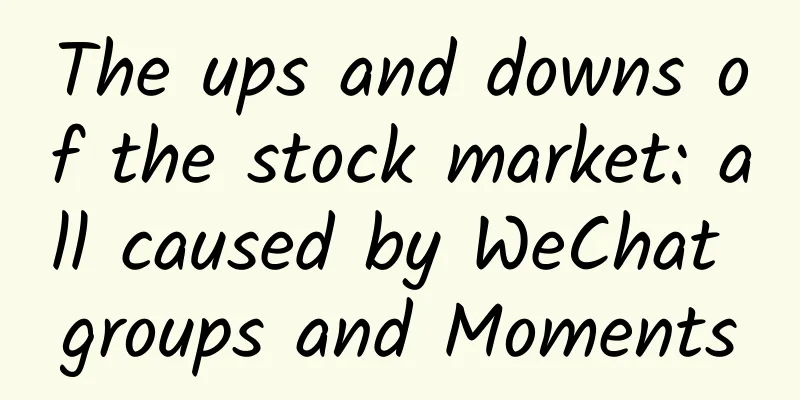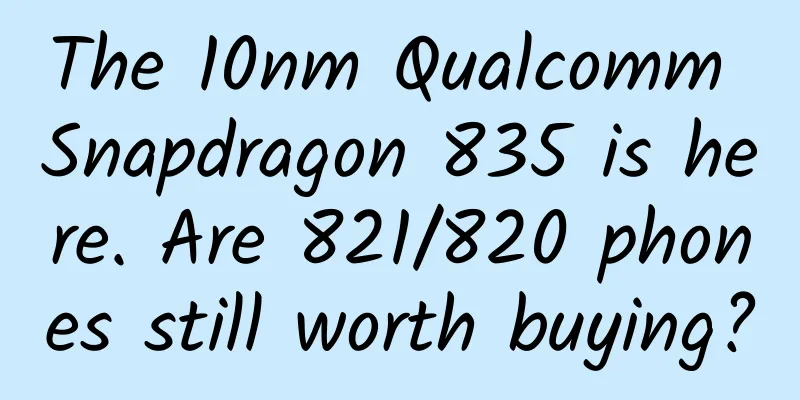The ups and downs of the stock market: all caused by WeChat groups and Moments

|
This new bull market in A-shares started from 2,000 points, to 3,000 points, and then to yesterday's closing plunge. The highs and lows came faster than most people imagined, especially in the past week. I know that you, who like to learn and think, must have read a lot of articles, reports, and jokes. You are already familiar with the policy, fundamentals, capital, and technology aspects. As for why the bull market is so early, various explanations and predictions, do you get excited or confused? Unfortunately, most of these analyses miss the point. I think the difference between this new bull market and the many bull markets of all sizes in history is not in funds, policies, or performance, but in this: this is the first bull market in the new media era. The new media era I am talking about refers to the social media era represented by WeChat Moments, Weibo, and SNS. What are the characteristics of the bull market in the new media era? I think it has changed the operating rules of the bull market cycle, which is "from the actions of a few people to a round of mass movement", with faster speed, more emotional and wider crowds. The efficiency, speed and strength of mass movements are no longer what they used to be. Although we all claim to think independently, the media's influence on us is far greater than we are willing to admit. Think about how much the older practice of dating and making friends has changed in this age of online videos and social media. Is it strange that it affects the stock market? Let's take a look at the history of information dissemination and emotional contagion in the stock market over the years: I remember when I first came into contact with the stock market around 2000, my friends who were a few years older than me said that the market would often fluctuate when the stock market opened in the afternoon. The reason was: I would go home from the securities business department for lunch at noon, discuss with my wife, and discuss with my stock friends, and then sell or buy in the afternoon. A few years ago, there was a rule that goes: Buy stocks in the New Year and you will never lose money for N years. In addition to various economic laws, there is also a reason for information dissemination: when you go home for the New Year, you will have a party with relatives and friends, drink and brag about your big gold teeth, and half-true and half-false stock money-making legends, money-making experiences, and money-making effects are often hot topics. So everyone secretly disagrees: "Even someone with his IQ can make money, why can't I?" After the New Year, the market opens, new money enters the market, and the market moves for a few months, and there is usually no problem. During the last bull market, from 2006 to 2007, A-shares rose from 1,000 points to 6,000 points. That wave of bull market still belonged to the period of half-new and half-old media. On the one hand, traditional media (including mainstream portals) dominated by newspapers and television still dominate. This is due to the instructions and requirements of relevant departments, as well as the caution, rigor and sense of responsibility of traditional media. In terms of article selection, viewpoints and emotional scale, in addition to opportunities and benefits, risks must be constantly reminded to balance the views of both long and short sides. Therefore, throughout the bull market, traditional media have been accompanying and guiding everyone to cross the river by feeling the stones with doubts and looking back every step of the way. During the bull market in 2006-2007, although social networking sites such as stock forums (including large BBS and segmented stock bars) were already very popular, their audience was still relatively narrow. If I had not entered the market, had not traded, and had become discouraged about stocks, I would not have visited these places at all and would not have been greatly affected by them. In addition, stock forums at that time often adopted the form of BBS that could be flipped and topped. Its characteristics were that it could build tall buildings (many layers of long historical posts) and produce celebrities. At that time, many stock forums had many folk masters (some of whom later became private equity fund managers), who wrote brilliantly and pointed out the world. Even if there were many ordinary stockholders, they could not attract attention. Most people simply lurked or followed the posts of celebrities. In this way, the stock forum became a semi-elite online media with a bit of the nature of a folk election "representative system". For launching a mass movement, there is an extra layer of filtering and a layer of trap, which is relatively slow to heat up. I think this is the first bull market in the new media era. The 300-400 million active users of WeChat Moments and WeChat group users have contributed greatly to this. In history, there has never been a bull market like this one, where a group of people with such a large total asset can spread (or live broadcast) exciting news such as daily limit, making money, bull market, crazy growth, opportunities, etc. among the crowd so instantly and quickly, in a time-free, anytime, anywhere, and mobile way, making you jealous of others' money-making effects. This is the scary thing about WeChat groups and Moments. The difference between WeChat groups, Moments and previous stock forums is that in the past, if you didn’t hang out in stock forums, a bull market would need a long period of fermentation, spread and infection to affect you. Now it’s different. You may have blocked a few heavy selfie lovers, baby-showing lovers and chicken soup lovers, but everyone you leave in Moments and WeChat groups may be a stock lover. The information that “they made quick money in stocks” has spread like wildfire from stockholders to non-stockholders as “viral content”, a speed that even marketing masters like Lei Jun and Luo Yonghao would be ashamed of. Everyone in the new media era is experiencing the baptism and torment of “people who are not smarter than me are also making quick money” on social media. This temptation is like a 20-year-old boy who is played striptease and AV on a loop every day. You can imagine. In addition to the cross-circle audience, penetration, and radiation, the content style in the new media era is also different from the previous bull market. Risk warnings and balanced views that are based on professional discipline, rigor, self-esteem, and restraint are becoming less and less. Pure oral content in WeChat circles and WeChat groups certainly likes to express emotions more excitedly. Those self-media and even websites also pursue exciting headlines, surprising themes, and passionate content in order to pursue the number of readings and forwardings. Balanced views? How unattractive that is. Let’s take a look at the following three investment stories from different historical periods: After Napoleon was defeated at Waterloo in 1815, the Rothschild family got the news in London in advance through their special channels, and became rich enough to rival a country. (In fact, this well-known story is wrong and does not conform to the facts, but it is such a good example that I can't help but borrow it) During the Spring Festival of 2007, Mr. Li, who lived in Xiangtan, Hunan, heard from his fellow villager, Xiao Zhang, that he had made hundreds of thousands of yuan by speculating in stocks, which was much better than working hard for a year. He searched online for information and found that the media had warned that "there are both opportunities and risks". After returning to work after the holiday, he waited and watched for a while, but finally could not hold back and jumped into the stock market. Nowadays, no matter whether you are in Beijing, Shanghai, Guangxi or Guizhou, no matter how focused you are on your job, and no matter if you don’t eat or drink with stock fans, as long as you are still using Moments, WeChat groups, and Weibo, you will be infected at the first time. The articles in Moments are much more straightforward and passionate than those in the past media (otherwise, how could there be so many reposts?), and the titles of researchers are more sensational than each other (otherwise, how could there be so many reposts). Therefore, you can’t help but open Yu’e Bao and online banking at any time to transfer money, buy stocks, and watch the prices rise. Happiness comes so easily. By the way: after the heart beats faster, the body's movements also become faster than before. At the beginning of the bull market in the past, when people were swept up in the mass movement and decided to go to the bank to transfer money, they had to take a leave or skip work to go to the bank or brokerage website. In today's new media era, people's assets are basically in Yu'e Bao and online banks, and they can move to the stock market anytime and anywhere. In the past, bull markets were often driven by institutions in the early stages. After a long period of education, brainwashing, and temptation, the masses could no longer hold back and reluctantly took off their clothes to enter the market. This time, the mass movement was obviously advanced, greatly bringing forward the climax of the exciting mass movement that used to occur in the second half of the bull market. The data released by the spokesperson of the China Securities Regulatory Commission last Friday night clearly matched Fan Yanzhi's judgment. And the blue chip stocks and brokerage stocks that have risen a lot recently are obviously also popular among the people. Fan Yanzhijian shamelessly predicts that within a week, every analyst, researcher, and reporter who wants to explain the ins and outs of this bull market will frequently quote the phrase "the first bull market in the new media era." Of course, how this bull market ended is another article. When that happens, I will write another article, "How did the bull market in the new media era end?" As a winner of Toutiao's Qingyun Plan and Baijiahao's Bai+ Plan, the 2019 Baidu Digital Author of the Year, the Baijiahao's Most Popular Author in the Technology Field, the 2019 Sogou Technology and Culture Author, and the 2021 Baijiahao Quarterly Influential Creator, he has won many awards, including the 2013 Sohu Best Industry Media Person, the 2015 China New Media Entrepreneurship Competition Beijing Third Place, the 2015 Guangmang Experience Award, the 2015 China New Media Entrepreneurship Competition Finals Third Place, and the 2018 Baidu Dynamic Annual Powerful Celebrity. |
<<: The Terminator of OLED? Quantum Dot Technology Lights Up the "Post-LCD" Era
Recommend
Why does Inke dare to occupy the top spot on the App Store list?
Crazy live streaming. Whether you are ready or no...
Save the "disappeared her" in your mind! Can protein modification help you "remember"?
◎Reporter Zhang Jiaxin Improving memory is an ete...
Why is the operation ineffective? You may be missing these 3 methods!
Every time you sell a product, you should keep re...
How do Taobao and Tmall sellers build private domain traffic?
Companies began to shift from acquiring new users...
5G is about to be commercialized! Ministry of Industry and Information Technology: The first version of 5G international standards will be determined in June this year
On January 30, it was reported that this year is ...
Price inquiry for the development of Kashgar Fresh Food Mini Program. How much does it cost to produce the Kashgar Fresh Food Mini Program?
How much does it cost to join a fresh food mini p...
An interview question: How did Uber recruit 1,000 drivers in a week?
An interview question and answer for an Uber oper...
The latest W boson mass measurement is consistent with the standard model; after talking with AI, people are less likely to believe in conspiracy theories | Technology Weekly
Compiled by Zhou Shuyi and Wang Xiang Antibiotic ...
Redmi Pro vs Meizu E review
Having the three major series of Meizu Blue, MX a...
A case study of the WeChat Moments distribution that sold 8,000 copies
Event background: On November 13, 2019, I saw a c...
7 essential skills for operators: Adhere to 4 principles and exercise your product thinking
The cultivation of this product thinking is not a...
After watching ofo’s new ad, I threw away the client’s brief!
Recently, ofo, the shared yellow bike company, re...
What is invisible secondary pollution?
How do you define whether your home is clean if y...
Catching toads and geckos? "Punishment"! Very "punishing"!
Do you remember the news that "Two men were ...
After the boom of live streaming and influencer economy, Weibo wants to be the connector between marketers and influencers!
The booming live streaming market and internet ce...









